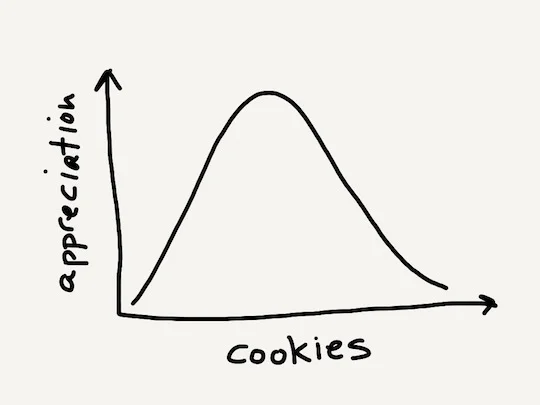Career Planning With Your Middle Finger
/Yesterday I had coffee with one of my best besties, and she was describing to me some of the horrors of her workplace … which I have a feeling won’t be her workplace for too much longer.
As she told me about having to apologize to people who fly off the handle for no reason, having to take orders from people who have no idea what her work is about, and having to endure micromanagement from people who end their list of inane requests with statements like, “And don’t accuse me of micromanaging!” … well I started to get kinda pissed on her behalf.
So I asked her -- what would happen if you just went in there with middle fingers blazing? Not literally, but figuratively … a symbol of an attitude of incredulity in the face of true silliness. What if you decided to do your job the way you think it should be done, “have to”s be damned, and tell the haters to suck it? What if you just ignored all the “helpful suggestions” and went about your business?
“I would probably get fired,” she replied, but I’m not so sure. Because, the thing is, she is excellent at her job. She regularly turns a routine task into something remarkable. Even though her bosses treat her like a child, even though they are batshit crazy and incapable of acting like adults, they still know that she does good work, and lots of it. And there is power in that.
So, from my point of view outside the situation, I can see that my beloved friend is suffering unnecessarily. She is in the sweet spot to get those middle fingers out and either transform her job into something she can deal with, or move on to something better.
How do I know this? Because I’ve followed the middle-finger career path for as long as I can remember, and people simply don’t treat me like this. When someone tries to micromanage me, well, that makes me giggle. When my boss asks me to do something in a way that I would never choose to do it, I explain to them why I’m not going to do that, and what I plan to do instead. When someone tries to force me to adhere to some stupid senseless policy, I am so busy kicking ass that I barely even hear them.
Is this because I am some magical creature that can’t be touched by the slings and arrows of modern work life? No. I think my ability to largely make my own rules in my work life mostly comes from the fact that I know how to flip a table when needed.
Do I mean actually flipping a table … not really. I mostly mean flipping a table in your mind. Cultivating a middle-finger attitude. Understanding that there are a thousand million jobs in the world, and as soon as you start thinking, “Whoa, shit, I really need this job,” they have you.
How do you do this? It starts by doing excellent work and knowing what you are talking about. So, if you are in a position where you’re not doing excellent work and you don’t know what you’re talking about, that’s the first place to start. Get better. Work harder. Learn.
Once you are awesome at what you do, THEN you can get out those middle fingers and wave them around a bit to create a bubble of Haha That’s Funny That You Think You Get To Fuck With Me. Like, when your boss says something insane, you can laugh like you know she’s just making a hilarious joke instead of actually trying to tell you, the expert, how to do your job. Instead of apologizing to crazy people for triggering their craziness, here’s how you will start dealing with them: you will ignore them and keep being awesome.
I understand that not every workplace has room for the kind of freedom that I’m talking about. And I know that sometimes it takes a little while to work out an escape plan.
But, seriously, have you ever known someone who had a shitty job or a horrible boss, and they just bummed out about it for years on end and never did anything about it? This is what I don’t want to happen to you, or to my bestie, because it is unnecessary.
There are always more jobs, just like there are always more prospective romantic partners, more people we could be friends with, more opportunities that would be great for us that we don’t even know about yet. There’s no need to be so risk-averse that we allow ourselves to languish away in a bad place. We only need to learn to get out those middle fingers and stop letting other people dictate how we feel and behave.
So … what would happen if my friend flipped a table at work? If she stopped being so conciliatory and started waving some middle fingers around in a light-hearted but deadly serious way? I think she might be surprised to see a change in how her colleagues treat her, and even more importantly, a change in how she sees herself.
I’m not asking anyone to turn into a mega-bitch … maybe just a tiny bitch. No need to drive all your colleagues away, but if you get a reputation for being someone who doesn’t suffer fools gladly, is that such a bad thing?
We ladies are raised to smooth things over, to say or do whatever needs to be said or done to keep a ball rolling, even if that ball is rolling over us. But sometimes that smooth path of least resistance involves more sacrifices than we should have to make. When that time comes, the best response, in my opinion, is to get out those middle fingers and let your voice rise up with Cee-Lo in a sweet, hearty chorus of “Fuck You.”
So here’s my advice to my gal, and to everyone who’s struggling with a shitty job where people treat you like an idiot: Stop smoothing over all the problems of the wackjobs around you. Do an excellent job, cultivate that middle-finger bubble, and realize that you already have the freedom to refuse to engage with insanity.
Thanks to Mr. Money Mustache for making me realize how applicable middle fingers are to just about everything, even grocery shopping.

















